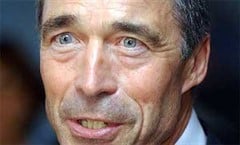
Buried beneath news of the Ice Bucket Challenge, and the latest video release by the Islamic State was an interview by NATO Secretary General Anders Fogh Rasmussen that should be of immediate concern to everyone.
These days, the actual importance of a news story is inversely proportional to the number of American media outlets that refuse to touch it. That would explain the virtual non-existence of the NATO chief’s interview on Wednesday that he gave to a handful of European newspapers.
Never content to let a good war go to waste, Rasmussen said the 28-member military bloc would be“spearheading” its way into the fleshy flanks of Eastern Europe, just a missile lob away from the Russian frontier. The reason – “Russian aggression” – should surprise nobody who has been following Ukraine’s slow-motion meltdown ever since Kiev attempted to form a more perfect union with Russia instead of the European Union. That’s when the Western-backed fireworks display, complete with John McCain and Victoria Nuland agitating/feeding the crowds in central Kiev, exploded, leaving Ukraine on the verge of total collapse, and US-Russian relations in tatters.
But I digress. Rasmussen chose his words carefully as he proudly pointed to NATO’s latest road map to Russia, decorated with brand new red flags: “In order to be able to provide such rapid reinforcements you also need some reception facilities in host nations. So it will involve the pre-positioning of supplies, of equipment, preparation of infrastructure, bases, and headquarters. The bottom line is you will in the future see a more visible NATO presence in the east.”
“Reception facilities?” Rasmussen makes the militarization of Eastern Europe sound so harmless and quaint. In a best-case scenario, NATO’s expansionist plans for Eastern Europe – which military observers anticipate will be in Poland and the Baltic States – will usher in a new arms race on the European continent (For those not familiar with modern maps, Latvia and Estonia share immediate borders with mainland Russia, whereas Lithuania and Poland envelop the Russian exclave of Kaliningrad).
There is probably no need to mention the worst-case scenario here, since in the event of another global conflagration it won’t matter what we brand it because few people will be around to remember it. As Albert Einstein once quipped: “I do not know with what weapons World War III will be fought, but World War IV will be fought with sticks and stones.”
It is important to consider several other remarks by the NATO chief since an arms race in Europe will only be a pleasant development for the merchants of death from the military industrial complex hawking their wares around an increasingly shaken planet.
Asked whether there would be permanent NATO bases in Eastern Europe, Rasmussen did not miss a beat: “The brief answer is yes. To prevent misunderstanding I use the phrase ‘for as long as necessary’. Our eastern allies will be satisfied when they see what is actually in the readiness action plan.”
Rasmussen said NATO forces could be deployed “within hours.”
The NATO chief then made some broad generalizations regarding Russia that were quite simply wrongheaded. This is no insignificant matter because when the average person on the street misjudges the geopolitical situation the stakes are not very high. But when the leader of the world’s most fearsome fighting force flunks a question on very recent history then that could be a sign we may be heading for some major turbulence.
Here is Rasmussen’s (mis)statement: “We have to face the reality that Russia does not consider NATO a partner. Russia is a nation that unfortunately for the first time since the Second World War has grabbed land by force. Obviously we have to adapt to that.”
Certainly Rasmussen recalls that it was Russia that requested on numerous occasions participation in NATO’s missile defense system, arguing that cooperation between the two sides on this controversial technology – which, in fact, may give the Europeans countries a false sense of security given that the system may not work as effectively as advertised – would only strengthen their ability to maintain peace and security on the continent.
Furthermore, if the system was really designed with Iran in mind, as has been claimed, wouldn’t Tehran seriously reconsider any evil designs against the European Union if it knew that Russia was also on board the project?
By flatly refusing Russia’s participation in Europe’s missile defense system, NATO and the United States have essentially admitted that the so-called reset between Moscow and Washington had been a deceptive ruse from the start, designed to make Russia believe that the West was sincere about a security partnership when in fact it wanted nothing of the sort. Worse, it could mean that the missile defense system itself is actually being designed with Russia in mind. Indeed, that is the unfortunate conclusion that Russia’s military has been forced to make.
Rasmussen’s remark that Russia “grabbed land by force” – apparently in reference to the Crimean Peninsula – is also patently wrong. The citizens of Crimea, watching helplessly as Ukraine erupted in unbridled violence and bloodshed, made the democratic decision to hold a referendum to join the Russian Federation. Such a development cannot be labeled a land grab (It should be noted that next month Scotland – and without the nuisance of bombs going off in their territory – will also vote in a referendum to decide whether or not to remain in the United Kingdom).
Finally, Rasmussen mused on Russia’s “remarkable change” in terms of its military capabilities over the past.
“We also saw a remarkable change in the Russian military approach and capability since, for instance, the Georgian war in 2008. We have seen the Russians improve their ability to act swiftly. They can within a very, very, short time convert a major military exercise into an offensive military operation,” he fretted.
As the leader of 28-member NATO, Rasmussen should know better than anybody that any military worth its salt should be able to “act swiftly” and “convert a major military exercise into an offensive military operation,” as NATO itself has been recklessly doing in numerous foreign countries over the last decade.
The difference, however, between NATO’s long list of global “interventions” and Russia’s conflict with Georgia is that Russian peacekeepers were deliberately attacked and killed by Georgian forces, thus prompting Russia to respond in kind. Is Russia not even permitted to defend itself from foreign attacks, even if the size of the invading force is small?
Since it has been so long since NATO actually carried out a legitimate war it apparently has forgotten what one looks like. What NATO has done in Afghanistan, Iraq, Libya and Pakistan, amongst many other places, should give anybody – and most of all, the Russians – tremendous pause.
In fact, Rasmussen seems more concerned with Russia’s ability to defend itself and “act swiftly” than anything else.
So how can such comments be explained, and why the sudden ratcheting up of tensions with Russia?
Although it may seem ridiculous to blame the sudden upsurge in bad blood on simple ‘Putin-envy,’ but there could be some truth to that. After all, the Russian president has been on a winning streak recently, much to the detriment of particular Western designs. Not only did the Russian leader almost singlehandedly defuse what appeared to be a certain American military offensive against Syria, his country also organized one of the most successful Olympic games in recent memory.
Moscow also got an unexpected visit in the summer by Edward Snowden, an American whistleblower from the National Security Agency who was granted political asylum by Russia after turning over thousands of classified documents to Guardian journalist Glenn Greenwald in Hong Kong. His revelations shed a glaring light on the extent of the NSA’s controversial intelligence work, as well as damaging Washington’s relations with some of its key allies, including Germany.
However, the real reason for NATO’s continual push eastwards is probably due to nothing more than crude geopolitical advantage.
The premier Western guru on geopolitical affairs, Zbigniew Brzezinski, previously mentioned the strategic importance of Ukraine for fulfilling his deranged dream of America becoming “the first, only, and last truly global superpower.”
In an interview with Kiev’s Weekly Digest in May 2005, Brzezinski coolly calculated that Ukraine “is certainly not a pawn; it may not be a queen, but it certainly is an important element on the chessboard – one of the most important.” I wonder what chess pieces Brzezinski would select to symbolize Poland, Estonia, Latvia and Lithuania? That is a question the people of those countries may want to consider.
Of course, one does not normally make allusions to the greatest game of strategy when discussing the question of democracy or human rights; that is because in NATO and America’s playbook democracy and the interests of the people are only of secondary importance.
Fear-mongering over an imaginary threat from Russia helps NATO break down national doors that would otherwise remain closed. Eastern Europe is being sacrificed as a pawn in NATO’s great game.
Reprinted with permission from RT.

